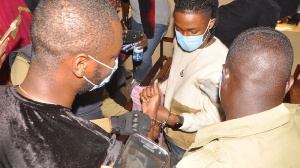 Nigerian artiste Stanley Omah Didia, alias Omah Lay, being handcuffed at Makindye Magistrate
Nigerian artiste Stanley Omah Didia, alias Omah Lay, being handcuffed at Makindye Magistrate
The crackdown by the Directorate of Citizenship and Immigration Control (DCIC) on foreign artistes and journalists without work permits could have far-reaching implications to the entertainment industry and international conferences in Uganda.
Last weekend, police arrested Nigerian artistes, who had performed in Kampala City without a work permit and violating the standard operating procedures put in place to control the spread of Coronavirus.
The spokesperson of DCIC, Mr. Jacob Siminyu, said the Nigerian artistes arrived in Uganda on tourist visas and performed illegally.
“They were supposed to be tourists in Uganda. They were breaching the law,” Mr Siminyu said in an interview.
Last month, DCIC also deported three foreign journalists attached to CBC News, a Canadian broadcaster, on grounds that they were operating without work permits.
According to DCIC, a foreigner who wants to do any work in Uganda for a period not exceeding three months must get a special pass.
Mr Siminyu said a foreigner can only apply for a special pass, which costs $100 (Shs367,000), after entering Uganda on a tourist/business visa, but the country reserves the right to accept or reject the application.
“The special pass takes five days [if] other factors [remain] constant,” he said.
This means the applicant, say an artiste or an expert that has to make a presentation at a conference as a facilitator, must arrive in the country six days before the event.
Ms Beatrice Lamwaka, who has organised several conferences in Uganda, said the policy will lead to the rise in the cost of holding international conferences or workshops since presenters will have to arrive in the country a week in advance in order to apply for the special passes.
“Experts will be reluctant to come to Uganda to make presentations because many want to start travelling after all the paperwork is done,” Ms Lamwaka said.
Mr Julius Kyazze, a top manager of Swangz Avenue, said a special pass (permit) is a new thing. He said whenever they hired an international artiste to perform in Uganda, they would declare the purpose of his visit and the amount they paid the artiste. The Uganda Revenue Authority would then charge them withholding tax from the payment to the artiste.
Mr Aly Bai, a promoter, said: “The artiste needs an entry visa and the promoter has to pay withholding tax based on the artiste’s fees. Also, the promoter needs to have the necessary event permits.”
Background:
Inconveniences. The first time government enforced the immigration regulations was on South African musician Yvonne Chaka Chaka, who was blocked from performing on New Year for not having a special pass to work in Uganda. She was immediately deported.
Before her arrival, Chaka Chaka had praised Ugandan Opposition leader Robert Kyagulanyi, alias Bobi Wine, as a great leader.
Mr Aloysius Matovu Joy Junior, who was one of the organisers for Chaka Chaka performance, said they made a huge financial loss. “We had paid Chaka Chaka $40,000 (Shs146m), spent on air tickets and hotel bills for her, her two children and a DJ.
She charged us less by $10,000 what she normally charges on international tours because she wanted to sing for Kabaka Ronald Muwenda Mutebi,” Mr Matovu said then.